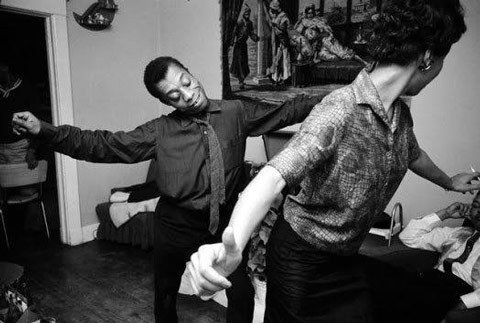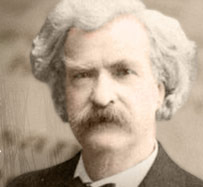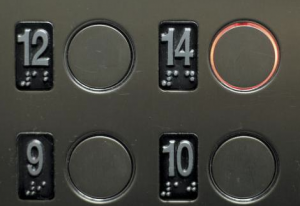The Paris Review's Blog, page 859
January 4, 2013
Jolly Writers, and Other News
Happy Friday. Here are twenty photos of authors whooping it up.
By way of balance, a catalogue of authors’ ailments.
The end of an era: the Borders flagship sign comes down.
In related news, Barnes & Noble reported tepid holiday sales.
“There aren’t any obvious candidates for the Nobel Prize and the prize committee is in an unenviable situation.” The lackluster rationale for Steinbeck’s 1962 win. (Lawrence Durrell, meanwhile, “gives a dubious aftertaste … because of [his] monomaniacal preoccupation with erotic complications.”)
January 3, 2013
Happy Birthday, J. R. R. Tolkien
In honor of January 3, enjoy this illustrated Christmas letter that the author drew for his son: a twenty-year tradition in the Tolkien home.
[Via Letters of Note.]
Saved
Ten years ago I was on the highway from Tennessee to Kentucky—can’t even remember the reason for the trip—but I kept the car radio on the AM band, set to “Scan,” because I’d noticed, over several years’ driving around this part of the world, how almost every small town you pass has at least one little church that’s broadcasting a low-wattage radio show, and you often hear fascinatingly crazy preaching on those transmissions and, less frequently, fine singing. That particular Sunday in January it was raining, and I was somewhere north of Memphis, passing depressing roadside storage buildings, when a remarkable live signal came across. The sound at first was like that of a giant wet towel rhythmically slapping on somebody’s back. After a minute I realized it came from hundreds of rain-soaked shoes stomping in unison on a concrete floor. I tried to imagine the inside of the church. It must have been cavernous. Or maybe—more likely—it was a warehouse, where this Pentecostal group had been forced to convene. Slap … slap … midtempo, it filled the car, as the people chanted a single line, “If He sends me, I’ll GO-oooo … If He sends me, I’ll GO-oooo,” a three-note melody, simple to the point of crudity, but with a strange elegance. Folks got up and started testifying. A woman thanked God because on Christmas Eve she’d gone to the welfare office to get food stamps, and there’d been something wrong with her forms—a paper she hadn’t known was expired—“but the man give it to me anyway,” she said. “God softened his heart.”
Oral Sadism and the Vegetarian Personality
Street Scene
 Well into my adolescence, New York City began and ended with a single street. For a long time, it did not even seem important that I learn the name of the street; everyone simply called it the Street of the People of Tang. The Tang, of course, were the Chinese, and Americans, foreigners to the street, named it Chinatown.
Well into my adolescence, New York City began and ended with a single street. For a long time, it did not even seem important that I learn the name of the street; everyone simply called it the Street of the People of Tang. The Tang, of course, were the Chinese, and Americans, foreigners to the street, named it Chinatown.
Of course, strictly speaking, I was a foreigner too. Because my mother worked in a suburban Connecticut town, all colonnaded colonials and frosty-haired WASPs, and spoke halting English, we boarded the Metro-North only when desperation over the last can of aoki mushrooms made it imperative. Later, when I grew to speak better English than she, I became the navigator. “So when we take the downtown green line, where is it that we get off again?” my mother would ask, eyes squinting nervously over the teeming throngs we would soon join at the mouth of Grand Central. Canal, I answered, always the same answer. We get off at Canal Street.
Literary Resolutions, and Other News
For indie bookstores, it was a happy holiday.
Speaking of—Prairie Lights Bookstore is starting a small press!
Tackling Pepys, and other literary resolutions.
Related? Literary feuds of 2012!
Now open for business: the London Centre for Book Arts.
January 2, 2013
Educational Viewing
We love the single-sentence animations Recommended Reading produces in concert with new fiction. In this latest, Grier Dill animates and scores a sentence from Lincoln Michel’s “Our Education.” Enjoy!
Fast, Cheap, and Out of Control: Modernists Go Off-Menu
The opening scenes of Charlie Chaplin’s Modern Times demonstrate the indignities mechanized factory production perpetrates upon the bodies of its workers. The first shot, of sheep herded into a pen, dissolves into one of men leaving the subway. They’re bound, the viewer assumes, for the kind of job in which the next cut finds Chaplin’s Little Tramp: working on an assembly line, his motions so repetitive that they become reflexive. He can’t stop twisting his wrists, as if to tighten bolts, even when he leaves the station where he tightens bolts all day. His body is so bound to the line and to the factory that the same boss who controls the conveyor belt’s speed also controls the movements of the Tramp’s body. Finally, the factory extends its control to the Tramp’s last autonomous function: eating his lunch.
A salesman so committed to mechanization that he lets a machine speak for him has brought to the factory boss’s office a prototype of “the Billows Feeding Machine, a practical device which automatically feeds your men while at work.” He asks the boss to pick one of his workers for a demonstration, and of course Chaplin’s Tramp is volunteered. Strapped into the machine, hands incapacitated, the helpless Tramp watches the machine rotate plates before him: soup, air-cooled between spoonfuls; corn, spinning on its cob; cubes of meat, pushed by a mechanical arm from the plate into his mouth; and finally cake for dessert. The machine promises to “eliminate the lunch hour.”
Even before the machine goes predictably haywire—speeding up, spilling soup on the Tramp’s shirt and cake in his face (always pausing, hilariously, to wipe his mouth)—it’s clear to the viewer that some kind of line has been crossed. Read More »
Happy 2013, From Mark Twain
“Now is the accepted time to make your regular annual good resolutions. Next week you can begin paving hell with them as usual. Yesterday, everybody smoked his last cigar, took his last drink, and swore his last oath. Today, we are a pious and exemplary community. Thirty days from now, we shall have cast our reformation to the winds and gone to cutting our ancient shortcomings considerably shorter than ever. We shall also reflect pleasantly upon how we did the same old thing last year about this time. However, go in, community. New Year’s is a harmless annual institution, of no particular use to anybody save as a scapegoat for promiscuous drunks, and friendly calls, and humbug resolutions, and we wish you to enjoy it with a looseness suited to the greatness of the occasion.”
—Mark Twain, letter to Virginia City Territorial Enterprise, January 1863
Lucky Thirteen
My apartment building on Manhattan’s Upper West Side is of the standard prewar varietal, with the faint chicken-soup-in-the-stairwell smell familiar to any New Yorker and an elevator that goes up to fourteen. And by fourteen, I mean, of course, thirteen. In this respect it is standard too; the elevator, made by Otis (I paused to double-check as I was writing this), indulges our collective superstition and forces those on the top floor to live a peculiar quotidian fiction.
In taller buildings, of course, everyone above twelve is technically living a lie, albeit of the white sort. This is a bit of magical thinking that never fails to delight me on even the darkest day. Read More »
The Paris Review's Blog
- The Paris Review's profile
- 305 followers











